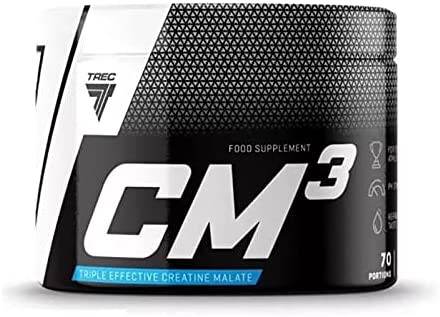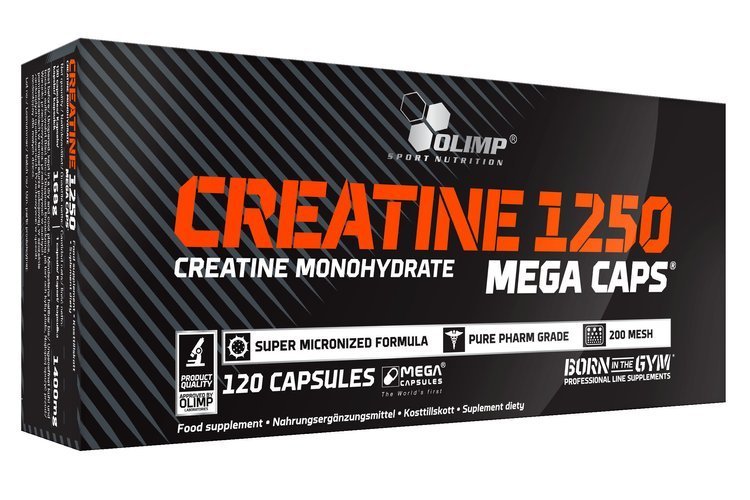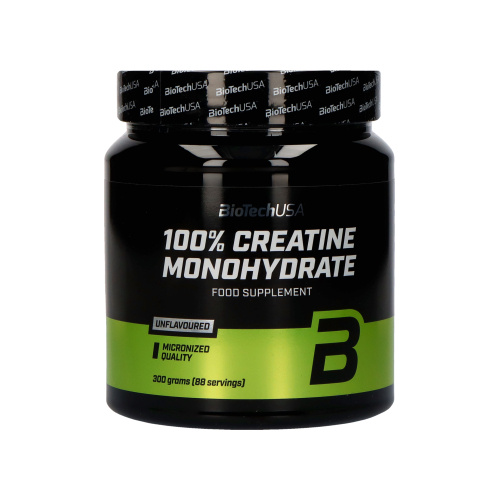- Home
- For athletes
- Creatine
Creatine - what it does, effects, side effects, dosage, opinions
Creatine is one of the best-researched dietary supplements with a high safety profile.


Learn more about our editorial process
.

Learn more about our editorial process
.

Learn more about our editorial process
.

Learn more about our editorial process
.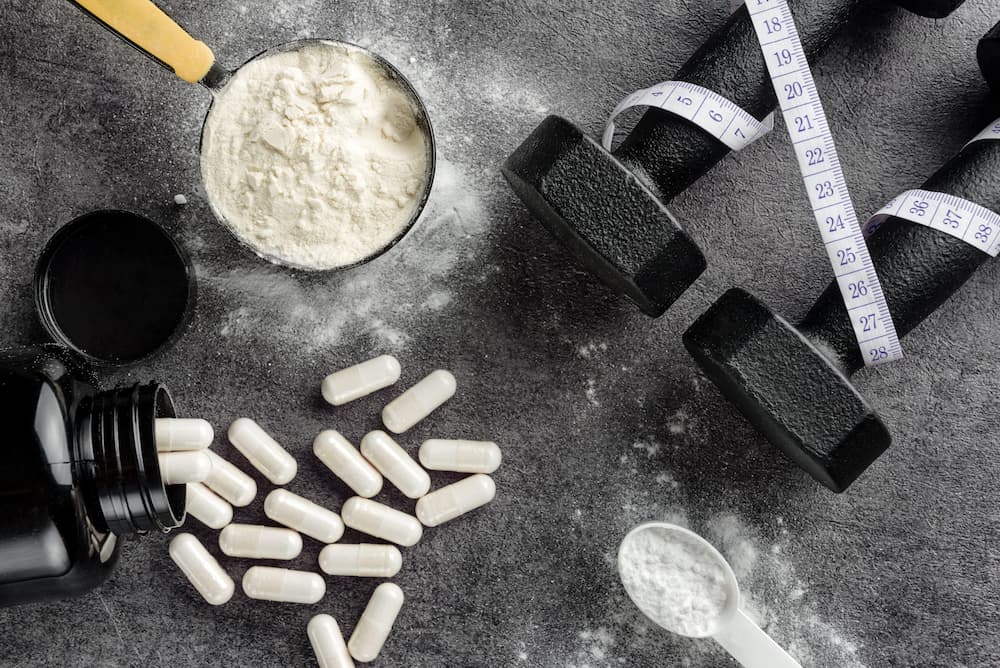
Why you can trust us
Articles on Natu.Care are written based on scientific research, data from government websites and other reliable sources. The texts are written in cooperation with doctors, nutritionists and other health and beauty experts. Articles are reviewed before publication and during significant updates.
.Learn more about our editorial process
.Information about advertisements
Content on Natu.Care may contain links to products from the sale of which we may receive a commission. When creating content, we adhere to high editorial standards and take care to be objective about the products discussed. The presence of affiliate links is not dictated by our partners, and we select the products we review ourselves completely independently.
.Learn more about our terms and Conditions
.The name creatine comes from the Greek word kreos, meaning 'meat'. It is often associated as the favourite supplement of muscular gym-goers with necks like Canadian sequoias. Wrongly so! Creatine is also a great supplement for training women and... seniors.
With experienced experts, I will introduce you to what creatine is and is not, and why it is worth supplementing - not just for muscle and strength gains.
.
From this article you will learn:
- What is creatine and what properties it has .
- What types of creatine there are and how to supplement .
- Do you need to do a loading phase and does creatine "flood" .
- What are the contraindications to use and side effects .
- Whether it is worth supplementing with creatine - experts' opinions .
See also:
- L-carnitine
- Caffeine
- White protein isolate (WPI) .
- Protein Concentrate (WPC) .
- Protein hydrolysate (WPH) .
- Protein nutrient
- BCAA - does it work or not? .
Creatine - what is it?
.
Creatine is an amino acid found mainly in skeletal muscle (about 95%) and in the brain and testesand. It is produced in the kidney, liver and pancreas. It consists of three amino acids: methionine, glycine and arginineand.
How does creatine work?
.
Creatine is a natural substance that is converted into phosphocreatine in the body . It helps to produce a substance called adenosine triphosphate (ATP). ATP provides energy to your muscles . Creatine is used as an anabolic supplement to promote muscle growth and post-workout recovery.
Creatine is mainly obtained from animal products such as beef, chicken, pork and fish. An average diet provides 1-2 g of creatine per dayand. The body produces approximately 1-2 g of creatine per day .
Important!
.Creatine is often confused with keratin. They are two completely different compounds with different properties. Keratin is a protein that is the building block of our hair, skin and nails.
Is creatine a steroid?
.
No, creatine is not a steroid or any illegal doping. The physiological and performance effects of anabolic steroids and creatine may be similar, but their mechanisms of action and legal classification are differentand. Steroids cause a number of dangerous side effectsand.
Creatine is well studied, safe for supplementation and rarely causes side effects. Steroids have no use in supporting the treatment of many ailments, unlike creatine, which, for example, has a positive effect on the nervous system.
.
 .
.
Marta Kaczorekclinical nutritionist and personal trainer
.
Creatine - what does it do?
.
Creatine supports the development of muscle tissue and increases strength (up to 5-15%), aids post-workout recovery and reduces DOMS (aka soreness), giving you extra motivation for further exercise, body shape and strength developmentand. It also supports brain function, improves performance and has antidepressant potential.
It is one of the best studied dietary supplements in the world and has an excellent safety profile.
What creatine is for and what creatine does without or with training:
Promotes muscle development
.
Does creatine build muscle? Yes, creatine supplementation with strength training contributes to the growth of muscle tissue. As well as affecting ATP energy production, creatine can improve muscle cell function in other waysand.
It increases the water content of muscle cells and the concentration of IGF-1, a key hormone for muscle growth. This, in turn, triggers several processes that lead to protein formation, creating new muscle mass .
Interesting research
.
- In a 12-week study involving strength-trained men, creatine increased muscle fibre growth 2-3 times more than training alone. In addition, the men performed better in bench pressing and squats (bench presses)and.
- A study involving people over 65 years of age found that creatine caused a significant increase in strength and muscle fibre area .
- A review of several hundred studies found that creatine supplementation for a minimum of three weeks combined with twice-weekly strength training increased muscle tissue growth .
Promotes muscle strength development
.
Research suggests that creatine can increase muscle power and strength by up to 5-15%. It enables you to do more work per training session, which is a key factor in long-term muscle growthand.
Interesting research
- In one study, creatine supplementation improved the performance of men strength training five times a week for four weeks. They increased repetitions and weights in bench press and squatsand.
- The study also found that creatine supplementation increased the number of repetitions and weights in bench press and squats.
- In another study, a group of men improved their weightlifting score in forearm bending after six weeks of creatine supplementation. The subjects lifted 15% more than before the period of creatine intakeand. .
- A study involving young women showed that creatine supplementation (20 g/day for four days followed by 5 g/day) during 10 weeks of resistance training significantly increased muscle mass and strength concentrations compared to placebo . .
The review of 250 studies compared the most popular supplements to support muscle building and strength. The analysis included organic compounds such as HMB, chromium, DHEA and androstenedione. Creatine showed the greatest benefits of alland.
Promotes brain function
.
The brain is said to be the most important 'muscle' and we should 'train' it to function properly. Creatine increases phosphocreatine stores in the brain, which may promote its 'fitness' and reduce symptoms of neurological conditions such as Parkinson's disease and ischaemic stroke. In addition, research suggests that it supports cognitive function in older peopleand.
Interesting research
.
Despite the many potential benefits of creatine supplementation in supporting the treatment of neurological diseases, the majority of studies to date have been conducted on animals.
There are, however, several promising human studies that suggest a positive effect of creatine on the neurological system:
- A study in healthy, adult humans suggests that creatine supplementation can improve short-term memory and cognitive function (e.g. reasoning, reaction time)and.
- A study involving children with brain injury showed a 70% reduction in fatigue and a 50% reduction in dizziness .
- A study involving vegetarians showed a 50% improvement in memory test scores and a 20% improvement in intelligence test scores .
Improves body performance
.
Research suggests that creatine may improve performance in high-intensity training (e.g. Sprint or HIIT exercises). An extensive review of the work in this area found that up to 70% of the studies conducted showed a positive effect of creatine supplementationand.
Interesting research
.
- A group of handball players took part in a test that involved eight 40-metre maximal sprints with a 25-second rest period in between. After five days of creatine supplementation at 15g per day, their performance improvedand.
- A study involving sprinters showed that creatine supplementation improved their performance in 100m and 6 x 60m interval running. The improved performance suggests increased availability of energy substrates to perform the effort, possibly as a result of an increase in creatine phosphate in skeletal muscleand.
- In a study involving swimmers, creatine supplementation at 25g per day for four days showed improved performance in maximal interval sessions . .
Aids recovery
.
Active people who supplement creatine during training experience fewer musculoskeletal injuries. In addition, creatine has an effect on speeding up recovery time after injury and less muscle atrophy after immobilisation (e.g. after an injury)and.
Influences on blood sugar levels
.
Research suggests that creatine supplementation has the potential to alter glucose metabolism. This promotes a healthier metabolic profile. This is because this supplement increases the function ofand:
- GLUT - a glucose transporter responsible for insulin-regulated glucose uptake into fat and muscle cells).
- AMPK - an enzyme involved in the regulation of lipid and glucose metabolism.
- AMPK - an enzyme involved in the regulation of lipid and glucose metabolism.
If you are being treated for conditions related to sugar-insulin metabolism (e.g. type II diabetes or insulin resistance), consult your healthcare provider before starting supplementation..
 .
.
Witold Tomaszewskidoctor of medical sciences
.Shows antidepressant potential
.
Many scientific evidence shows that depressive disorders affect brain structure, function and even volume. Clinical studies suggest that creatine may have an antidepressant effect by affecting hormones and neurotransmittersand. In what way?"
Is it worth taking creatine? Yes! Creatine has an effect on neurotransmitters (dopamine and serotonin). Regular supplementation increases serotonin levels (the so-called 'happy hormone'), which can improve mood and counteract depression..
 .
.
Marta Kaczorekclinical nutritionist and personal trainer
Chicken, rice and creatine. Is creatine only for athletes?
.
No, creatine can support more than just muscle tissue growth. Research suggests its potential to support the nervous system, which is important especially in the context of older people at risk of various neurodegenerative diseases, among othersand.
Older people often struggle with diseases that impair their brain and nervous system function. Creatine supports memory, reaction time to stimuli and reduces neurological disorders. Older people often have liver problems - creatine supplementation improves liver health..
 .
.
Marta Kaczorek clinical nutritionist and personal trainer
Sarcopenia (loss of skeletal muscle and its function) is also a problem for older people. Creatine supplementation, combined with exercise, helps to maintain muscle function, adds the nutritionist.
Creatine supplementation can help to maintain muscle function.
Creatine - product overview
.
Creatine can be purchased in various forms and formulations. You can choose between powder or capsules. Here is a brief overview of creatine supplements.
Trec CM3 powder
Product description
A well-soluble form of malate that does not cause water retention in the body. Available in four flavors.
Olimp Creatine 1250 Mega Caps
Product description
The capsules are precise in dosage and convenient - you can put them in a container. Enough for 50 days of supplementation.
BioTech USA Creatine Monohydrate
Product description
The capsules are precise in dosage and convenient - you can put them in a container. Enough for 50 days of supplementation.
Important: In August 2023, mercury was detected in SFD's creatine. Independent research carried out on the initiative of Bartłomiej Szkutnik of Fit Reviews found that the mercury standard in creatine products was exceeded by 1300%. If you have lower products, please contact the manufacturer for a refund.
- SFD Creatine 200 cap 1E3.T00 07/2024
- SFD Creatine 200 cap 4E2.T00 07/2024
- ALLNUTRITION Creatine muscle max 500 g natural 1E5.T24 09/2024
- ALLNUTRITION Creatine muscle max 500 g natural 4E2.T24 07/2024
- ALLNUTRITION Creatine muscle max 500 g natural 3E4.T24 08/2024
- SFD Creatine 250 g natural 2E3.T24 07/2024
- SFD Creatine 200 cap PE1.T00 06/2024
Creatine types
.
Creatine comes in several different forms. Which are they and which one is best absorbed?
.
Creatine monohydrate
.
This is a combination of creatine and water molecules. This form is the best studied and is more stable, faster digested and more effective at increasing creatine levels in the muscles than some of the more modern varietiesand. In addition, it is the cheapest form of this supplement, increasing its advantage over other types.
Creatine malate
.
This form is also known as TCM (tri creatine malate). It is a compound made from creatine monohydrate and malic acid. The addition of malic acid makes this form better tolerated by people with sensitive stomachs. Malate does not cause water retention (stagnation) as monohydrate does.
.
Creatine citrate
.
This form (tri-creatine citrate) is a combination of one creatine molecule and three citric acid molecules. This form also provides an effective increase in lean muscle mass, but deprives the retention that can occur after the consumption of creatine monohydrate.
Creatine citrate is a form of creatine monohydrate.
Other types of creatine
.
Other forms of creatine include, for exampleand.:
- ethyl ester, .
- nitrate, .
- hydrochloride, .
- gluconate, .
- α-ketoglutarate, .
- orotate, .
These forms are not used as often in scientific studies and are not as well validated. Most studies suggest that ingestion of these forms has less physiological impact on intramuscular creatine stores and performance than monohydrate.
Creatine for the body.
Creatine for women - does such a thing even exist?
.
There is no dedicated form of this supplement for women. Many of them worry that creatine supplementation will affect them negatively, causing too much muscle growth or the appearance of male characteristics. Nothing could be further from the truth. Creatine is a good supplement for women of all ages.
The use of creatine by peri-menopausal women has many positive effects, including an increase in endurance and muscle strength - and even without training..
 .
.
Marta Kaczorekclinical nutritionist and personal trainer
Interestingly, women may have higher intramuscular creatine concentrations probably due to lower skeletal muscle massand. This may explain women's greater exercise endurance and faster post-workout recovery .
Creatine - how to use?
.
To achieve full muscle saturation it is recommended to use: 3-5 g of creatine per day or 0.3 g of creatine per kg of body weight for one week, followed by 0.03 g per kg of body weight for 4-6 weeks (known as the loading phase).
The body's requirement for creatine
.
Our body needs to supplement approximately 1-3 g of creatine per day to maintain normal (non-supplemented) creatine stores depending on the amount of muscle massand. About half of the daily creatine requirement is obtained from diet. The remaining amount of creatine is mainly synthesised in the liver, kidneys from arginine and glycine .
Recommended dosage
.
It is usually recommended to take 3-5 g of creatine once a day, regardless of the time of day. Such supplementation will increase creatine stores in the muscles in 3-4 weeks. Creatine can be taken daily, no need to take breaks in supplementationand.
Research has shown many health benefits in athletes who took creatine daily, over a long period of time. There is no evidence to support detrimental side effects in people who consume high doses of creatine (as much as 30 grams/day) for up to 5 years.
Creatine has been shown to have many health benefits.
See also: Protein before or after training? 'Boar' advises
Cycle - loading phase. Does it make sense?"
The so-called loading cycle consists of several days of higher creatine intake to saturate the muscles with it more quicklyand. For 5-7 days, 0.3g of creatine per kg of body weight is consumed. This is followed by a maintenance dose of 0.03 g per 1 kg body weight for 4-6 weeks.
Must be aware that such high doses during the loading phase may cause gastrointestinal discomfort..
 .
.
Marek Prawdzik personal trainer and training author
Scientific evidence shows that it is not necessary to 'load up' with creatine. Daily doses of creatine (i.e. 3-5g/day) are effective in increasing intramuscular creatine stores and muscle performanceand.
I occasionally use a loading cycle with clients prior to strength competitions e.g. doubles, triathlon to saturate muscle cells with creatine as quickly as possible. In the long-term aspect, this is not necessary. In 99% of my clients' cases, I use doses of 3-5 g with them from the very beginning..
 .
.
Marek Prawdzik personal trainer and training author
Does creatine have side effects?
.
In some people, taking creatine on an empty stomach can cause gastrointestinal upset such as nausea and diarrhoeaand. This can be avoided by consuming creatine with a meal or by choosing a form other than monohydrate - such as malate. The only clinically relevant side effect reported in the scientific literature is weight gain .
Does creatine make you fat?
.
Weight gain during supplementation is related to the 'hydration' of muscle tissue. Creatine is taken up into the muscles by the creatine transporter, which is sodium-dependent. Because of the presence of this mineral, water will also be taken into the muscle. Therefore, weight gain should not be a concern - it is not associated with fat gainand.
Does creatine harm the liver and kidneys, for example?
.
Creatine supplementation has no significant side effects in healthy people who take a dose tailored to their needs, body weight and the manufacturer's guidelines. Individuals with kidney or liver conditions should consult a healthcare practitioner before starting supplementation.
Creatine contraindications
.
Creatine should not be usedand:
- Pregnant and lactating women, due to insufficient evidence on the safety of creatine use during this period of a woman's life.
- Pregnant and lactating women.
- Persons with diagnosed bipolar disorder, as creatine may exacerbate mania (increased mood, hyperactivity, increased mental activity).
- Persons with diagnosed bipolar disorder, as creatine may exacerbate mania (increased mood, hyperactivity, increased mental activity).
- People with diagnosed kidney or liver disease should consult a doctor before starting supplementation. .
Creatine in food
.
Creatine is found in many foods. Where is most of itand?
Natural sources of creatine
.
- herring: 6.6-9.5 g/kg .
- pork: 5.1 g/kg .
- beef: 4.4 g/kg
- beef: 4.4 g/kg
- tuna: 4 g/kg .
- chicken: 3.4 g/kg .
- rabbit: 3.4 g/kg
- liver: 0.2 g/kg
Vegetarians tend to have low creatine stores because they do not eat meat, which is the main natural dietary source..
 .
.
Marta Kaczorek clinical nutritionist and personal trainer
.
Expert opinions - is it worth taking creatine?
.
What do experienced experts think about creatine supplementation?
.
A growing body of scientific evidence shows the benefits of creatine supplementation not only in strength sports. It also affects athletes in other sports by increasing muscle glycogen storage, improving muscle recovery, regulating water and electrolyte balance or reducing the risk of injury.
.
 .
.
Marek Prawdzik personal trainer and training author
.
In addition to its pro-sporting effects, creatine also has a number of supportive actions towards our body. It is a substance that "runs out quickly" because it is constantly needed. Without its supply and systematic delivery from diet or supplements, it can be the missing brick in the whole building called the body - in which case we can easily "go haywire"..
 .
.
Marta Kaczorekclinical nutritionist and personal trainer
I appreciate creatine because of its multifaceted effects on the body and clinical use. It helps with conditions such as myopathies, neurodegenerative disorders, metabolic disorders, liver and kidney disease and inflammation. Creatine has antioxidant and anti-inflammatory effects and lowers homocysteine levels - thereby improving blood vessel health..
 .
.
Julia SkrajdaDietitian
.See also:
.
- Citrulline, the pump for your muscles
- Collagen for athletes - does it work? .
- Omega-3 in an athlete's diet: benefits
- Vegetable protein
- Casein - a bedtime protein
- Adaptogens
- Berberine
- Piperine
- Ashwagandha
- Ashwagandha dosage
- Curcuma
- Curcuma tablets
I have been supplementing with creatine for three years. I have noticed gains in both strength and muscle volume. As well as breaking records at the gym, I can also carry more shopping nets.
Summary
.- Creatine is one of the best researched dietary supplements in the world. It has a high safety profile and has few side effects.
- Creatinine is one of the best studied supplements in the world.
- The best form of creatine is monohydrate.
- The best form of creatine is monohydrate.
- It is recommended to take 3-5g of creatine per day, regardless of the time of day.
- The "loading" phase is the best form of creatine.
- A creatine "loading" phase is not necessary. .
- Natural sources of creatine include, for example, beef, pork and chicken. .
- Creatine does not cause 'flooding' or fat gain, and weight gain during supplementation is related to muscle hydration. .
- It is worth including creatine supplementation, especially if you are strength training. You will improve your strength and muscle development.
- Creatine can be supplemented by women - it does not cause weight gain or change your physique to that of a man.
- Creatine has shown potential as a treatment support for several diseases related to the nervous system.
FAQ
.Creatine before or after a workout?
.The time of intake of creatine is irrelevant. Based on the limited scientific studies available, it is unclear whether there are reliable differences between taking creatine before or after exercise. A convenient solution is to buy flavourless creatine and sprinkle it into post-workout protein shakes. Use it as you are comfortable, remembering to consume creatine preferably with a meal.
.Is creatine safe?
.Yes, creatine is safe for supplementation. It is one of the best researched dietary supplements, with few contraindications and side effects. This is confirmed by numerous scientific studies.
Why is creatine expensive?
.The increase in the price of creatine is linked to the COVID-19 pandemic, when at the time the fitness industry, among others, was unsettled due to raw material availability issues and supply interruptions. The price of creatine recorded an average increase of 100% in price.
What is better creatine or protein?
.It is impossible to say which is better - creatine or protein - as they are compounds with different properties and different purposes. When strength training, it is worth considering consuming both, for supplementing protein in the diet and helping to build muscle tissue.
Can women take creatine?
.Yes, women can take creatine. Contrary to the fears of many, creatine does not cause uncontrollable muscle growth, a masculine physique, hormone disruption or fat gain.
Does creatine cause acne?
.No, creatine does not cause acne. Interestingly, scientific studies suggest it has a positive effect on skin condition when used as an ingredient in anti-ageing creams. Creatine is being studied to protect the skin from oxidative stress and harmful UV rays.
Can children and teenagers take creatine?
.Based on the limited scientific evidence to date, creatine supplementation appears safe and potentially beneficial for children and adolescents. Refer back to the paragraph on the properties and example of a study involving children.
Does hair fall out from creatine?
.The current body of scientific evidence does not suggest that creatine supplementation increases levels of total testosterone, free testosterone, DHT or causes hair loss, or baldness.
Does creatine flood?
.No, creatine does not 'flood'. It does not cause fat accumulation. Weight gain during creatine supplementation is related to retaining more water in the body. Creatine is taken up into the muscles by the creatine transporter, which is sodium-dependent. Because of the presence of this mineral ingredient, water will also be taken into the muscle.
.
Sources
.See all
.Antonio, J., Candow, D. G., Forbes, S. C., Gualano, B., Jagim, A. R., Kreider, R. B., Rawson, E. S., Smith-Ryan, A. E., VanDusseldorp, T. A., Willoughby, D. S., & Ziegenfuss, T. N. (2021). Common questions and misconceptions about creatine supplementation: What does the scientific evidence really show? Journal of the International Society of Sports Nutrition, 18(1), 13. https://doi.org/10.1186/s12970-021-00412-w
Avgerinos, K. I., Spyrou, N., Bougioukas, K. I., & Kapogiannis, D. (2018). Effects of creatine supplementation on cognitive function of healthy individuals: A systematic review of randomized controlled trials. Experimental Gerontology, 108, 166-173. https://doi.org/10.1016/j.exger.2018.04.013
Brose, A., Parise, G., & Tarnopolsky, M. A. (2003). Creatine Supplementation Enhances Isometric Strength and Body Composition Improvements Following Strength Exercise Training in Older Adults. The Journals of Gerontology: Series A, 58(1), B11-B19. https://doi.org/10.1093/gerona/58.1.B11
Brosnan, M. E., & Brosnan, J. T. (2016). The role of dietary creatine. Amino Acids, 48(8), 1785-1791. https://doi.org/10.1007/s00726-016-2188-1
Burke, D. G., Candow, D. G., Chilibeck, P. D., MacNeil, L. G., Roy, B. D., Tarnopolsky, M. A., & Ziegenfuss, T. (2008). Effect of creatine supplementation and resistance-exercise training on muscle insulin-like growth factor in young adults. International Journal of Sport Nutrition and Exercise Metabolism, 18(4), 389-398. https://doi.org/10.1123/ijsnem.18.4.389
Deldicque, L., Theisen, D., Bertrand, L., Hespel, P., Hue, L., & Francaux, M. (2007). Creatine enhances differentiation of myogenic C2C12 cells by activating both p38 and Akt/PKB pathways. American Journal of Physiology. Cell Physiology, 293(4), C1263-1271. https://doi.org/10.1152/ajpcell.00162.2007
Delpino, F. M., & Figueiredo, L. M. (2022). Does creatine supplementation improve glycemic control and insulin resistance in healthy and diabetic patients? A systematic review and meta-analysis. Clinical Nutrition ESPEN, 47, 128-134. https://doi.org/10.1016/j.clnesp.2021.11.006
Eijnde, B. O. 't, Ursø, B., Richter, E. A., Greenhaff, P. L., & Hespel, P. (2001). Effect of Oral Creatine Supplementation on Human Muscle GLUT4 Protein Content After Immobilization. Diabetes, 50(1), 18-23. https://doi.org/10.2337/diabetes.50.1.18
Kious, B. M., Kondo, D. G., & Renshaw, P. F. (2019). Creatine for the Treatment of Depression. Biomolecules, 9(9), Article 9. https://doi.org/10.3390/biom9090406
Kreider, R. B., Kalman, D. S., Antonio, J., Ziegenfuss, T. N., Wildman, R., Collins, R., Candow, D. G., Kleiner, S. M., Almada, A. L., & Lopez, H. L. (2017). International Society of Sports Nutrition position stand: Safety and efficacy of creatine supplementation in exercise, sport, and medicine. Journal of the International Society of Sports Nutrition, 14(1), 18. https://doi.org/10.1186/s12970-017-0173-z
McMorris, T., Mielcarz, G., Harris, R. C., Swain, J. P., & Howard, A. (2007). Creatine Supplementation and Cognitive Performance in Elderly Individuals. Aging, Neuropsychology, and Cognition, 14(5), 517-528. https://doi.org/10.1080/13825580600788100
Nissen, S. L., & Sharp, R. L. (2003). Effect of dietary supplements on lean mass and strength gains with resistance exercise: A meta-analysis. Journal of Applied Physiology, 94(2), 651-659. https://doi.org/10.1152/japplphysiol.00755.2002
Parise, G., Mihic, S., MacLennan, D., Yarasheski, K. E., & Tarnopolsky, M. A. (2001). Effects of acute creatine monohydrate supplementation on leucine kinetics and mixed-muscle protein synthesis. Journal of Applied Physiology (Bethesda, Md.: 1985), 91(3), 1041-1047. https://doi.org/10.1152/jappl.2001.91.3.1041
Pinto, C. L., Botelho, P. B., Pimentel, G. D., Campos-Ferraz, P. L., & Mota, J. F. (2016). Creatine supplementation and glycemic control: A systematic review. Amino Acids, 48(9), 2103-2129. https://doi.org/10.1007/s00726-016-2277-1
Ribeiro, F., Longobardi, I., Perim, P., Duarte, B., Ferreira, P., Gualano, B., Roschel, H., & Saunders, B. (2021). Timing of Creatine Supplementation around Exercise: A Real Concern? Nutrients, 13(8), Article 8. https://doi.org/10.3390/nu13082844
Richter, E. A., & Ruderman, N. B. (2009). AMPK and the biochemistry of exercise: Implications for human health and disease. Biochemical Journal, 418(2), 261-275. https://doi.org/10.1042/BJ20082055
Sakellaris, G., Nasis, G., Kotsiou, M., Tamiolaki, M., Charissis, G., & Evangeliou, A. (2008). Prevention of traumatic headache, dizziness and fatigue with creatine administration. A pilot study. Acta Paediatrica, 97(1), 31–34. https://doi.org/10.1111/j.1651-2227.2007.00529.x
Stöckli, J., Fazakerley, D. J., & James, D. E. (2011). GLUT4 exocytosis. Journal of Cell Science, 124(24), 4147-4159. https://doi.org/10.1242/jcs.097063
Tarnopolsky, M. A., & MacLennan, D. P. (2000). Creatine Monohydrate Supplementation Enhances High-Intensity Exercise Performance in Males and Females. International Journal of Sport Nutrition and Exercise Metabolism, 10(4), 452-463. https://doi.org/10.1123/ijsnem.10.4.452
Theodorou, A. S., Cooke, C. B., King, R. F. G. J., Hood, C., Denison, T., Wainwright, B. G., & Havenetidis, K. (1999). The effect of longer-term creatine supplementation on elite swimming performance after an acute creatine loading. Journal of Sports Sciences, 17(11), 853-859. https://doi.org/10.1080/026404199365416
Volek, J. S., Ratamess, N. A., Rubin, M. R., Gómez, A. L., French, D. N., McGuigan, M. M., Scheett, T. P., Sharman, M. J., Häkkinen, K., & Kraemer, W. J. (2004). The effects of creatine supplementation on muscular performance and body composition responses to short-term resistance training overreaching. European Journal of Applied Physiology, 91(5), 628-637. https://doi.org/10.1007/s00421-003-1031-z
.
Editorials
Meet the team


Editor
Graduate of Journalism and Artes Liberales at the University of Warsaw. Since 2017, he has been working with the biggest portals in Poland and abroad as an editor. Previously worked for 3 years in one of the leading pharmaceutical companies - he knows the health and beauty industry inside out. In his free time, he most enjoys playing tennis or skiing.

L-carnitine supports not only weight reduction, but also your liver and... fertility.
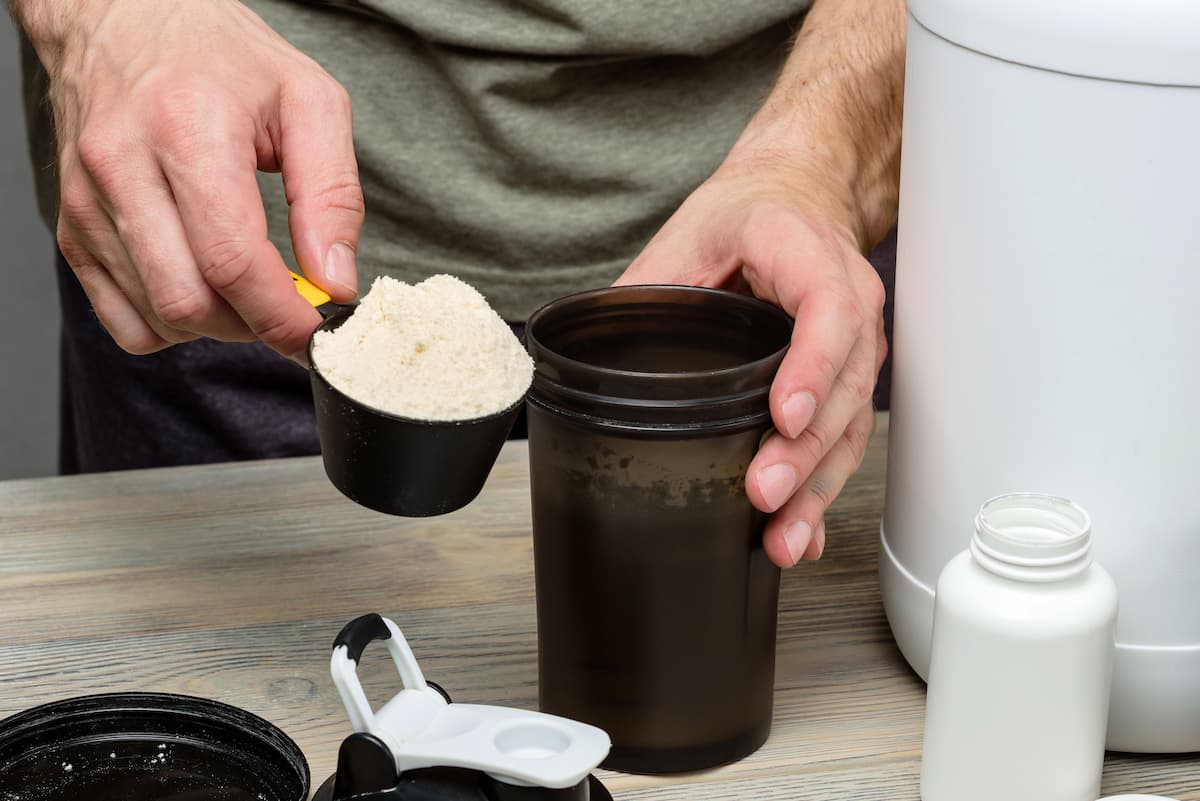
Citrulline is an amino acid that is a common choice for supplementation among athletes.
